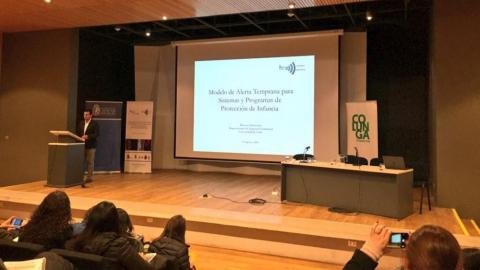
The first results of the Fondef project “Early warning prototype systems and programs for the protection of children from a rights perspective” were presented in front of a packed auditorium. The project aims to create solutions and facilitate decisions for the children´s rights crisis in our country.
This initiative is directed by Teresa Matus, director of Social Work in the Faculty of Social Sciences (FACSO), University of Chile, and Patricio Valenzuela, also a research associate of the Center for Public Systems (CSP). The initiative has a multidisciplinary focus provided by professionals in the areas of sociology, psychology, social work, industrial engineering, law and economics from the universities of Chile, Catholic University, and Diego Portales; a group in which, it has to be emphasized, also participates the Director of Investigation of the CSP, Javier Fuenzalida.
A second panel titled “Observing the failures” analyzed the different failures of the Chilean protection system from the economics, sociology, and computer science perspectives.
On the other hand, Patricio Valenzuela, academic of Industrial Engineering and researcher with the MIPP Millennium Institute as well as the CSP, presented the paper “The early warning model for childhood protection systems and programs”.
During his presentation, Valenzuela revealed the formulas, data, and parameters used in the econometric model created for the monitoring, evaluation and early warning of child protection systems in Chile.
“A monitoring system is a tool that supports the decision-making of public policies by providing relevant information on the effectiveness of the programs to which a public budget is allocated,” he explained.
“My challenge is to build econometric models within research, for better application and decision-making on issues of child protection,” added Valenzuela.
In the framework of his presentation, Valenzuela also gave details about the supply and quality of child services, and how potential gaps in said supply might influence the deprivation of children’s rights and, finally, their quality of life.
An example, he said, is the infant mortality rate, with 8.1 deaths per 1,000 children born alive in Coquimbo, compared to about 18% in Galvarino. “Many times we can see through these mathematical models that only because of the place where they are born, children see their rights being violated. This type of information is precisely what this project permits to be contributed ” he said.
“We have a unique opportunity because we have a lot of data on our country, from which it is possible to gather information that supports public policies,” he concluded
At the closing of the seminar, Charlotte Hurtado, Colomba Leon, Joselyn Faez, Susan Fuentes, Polette Vega and Consuelo Urra, students of the Effective Innovations in Public Policy Nucleus, presented: “When the failures are systemic: another memory for Lissette, Amber and Ariel”, an exhibition in which they related the life stories of these children hosted by SENAME and the systemic failures of child protection.
If you want to know more about the research and investigations of the Early Warning System you can visit the following link
MIPP Chile 2025